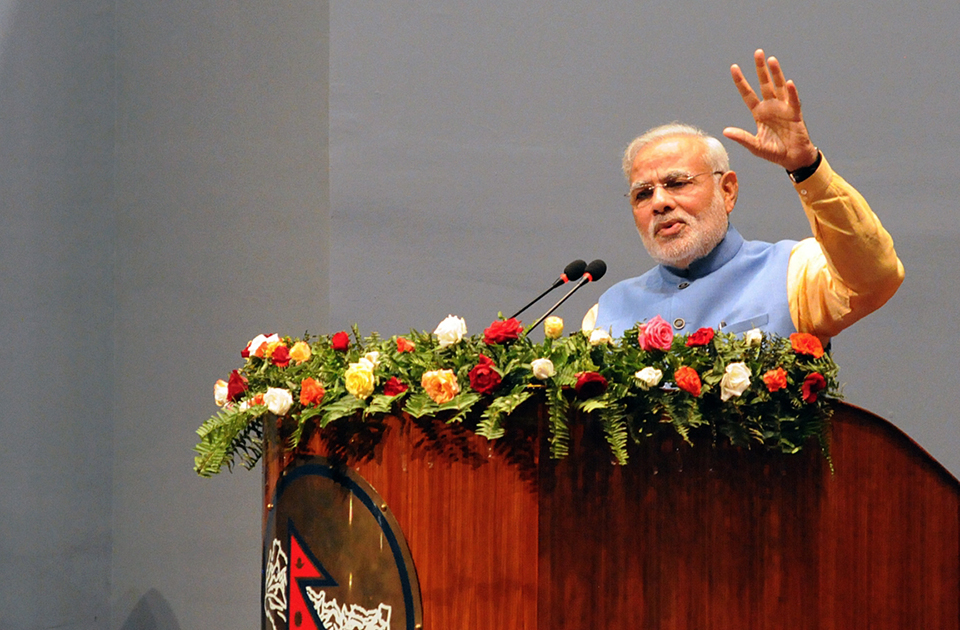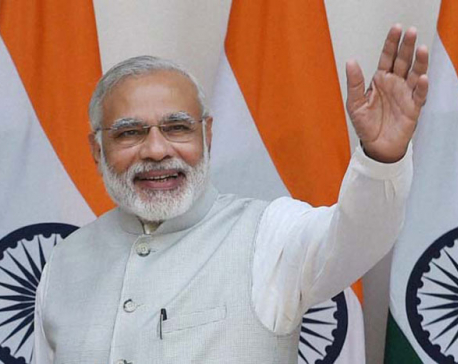
OR


Jhalak Prasad Khanal
The author is chief executive officer of Lumbini Bikas Banknews@myrepublica.com
More from Author
India should be happy that Nepal finally got the new constitution after decades of struggle and is now working to implement it.
As a country that has been for ages sharing cordial historical, cultural and people to people relations with India, Nepal was eagerly waiting to roll out red carpet to the high-profile Indian guest, as there had been no visit to Nepal by a sitting Indian prime minister since 1997. Then, in August 2014, Narendra Modi made a historic visit to Nepal soon after assuming office.
Modi won the hearts of Nepali people through his speech in the parliament. He acknowledged that Nepal is the birthplace of Lord Buddha, pledged to help Nepal in its economic development, promised to expedite works of Pancheswar, Upper Karnali and Arun III hydropower projects and told Nepalis that India was ready to revise the 1950 Peace and Friendship Treaty, as Nepal wanted.
Wherever he went, he was greeted by huge crowds. Nepalis talked of him with respect and praised his benevolence. Modi came to Nepal again in November 2014, just three months after his first trip, to attend the 18th SAARC Summit in Kathmandu and reiterated Indian support for Nepal.
When earthquakes devastated Nepal in April 2015, India quickly responded with prompt relief. Indian people also helped with relief operations. Those were the days when India had proved through action that it is Nepal’s true friend.
Cruel twist
But things changed as soon as Nepal started the process of unveiling the constitution through its sovereign Constituent Assembly. Before its promulgation, a few influential Nepali leaders had visited India and held talks with top Indian leaders and bureaucrats (the details of these meetings have not been revealed yet). Then Indian Ambassador in Kathmandu started advising that the process be delayed as the draft constitution did not address Madhesi grievances. Indian leaders started to say they wanted “inclusive constitution” in Nepal and therefore agitating Madhesi forces need to be taken into confidence.
Then, on September 17, 2017, India sent foreign secretary S Jaishankar as its special envoy to remind the Nepali leaders to take Madhesi leaders into confidence and to halt the process until that happens. Nepali leaders flatly rejected Jaishankar’s proposal as ‘it came too late’. Instead, they maintained that contentious issues can be resolved through later amendments. Jaishankar went back home distraught. So when around 90 percent lawmakers endorsed the constitution and Constituent Assembly unveiled it on September 20, India simply “noted” the event.
Perhaps Nepali leaders were reminded of a similar negative reaction by India in 1975 when King Birendra had proposed to declare Nepal “a zone of peace”. India did not support that initiative, which was one of the reasons the proposal could not materialize.
Political parties sought Indian support for new constitution, but in vain. Instead, India imposed a five-month-long blockade. India, however, has never admitted to the blockade and argues that it was the result of obstructions created by agitating Madhesi leaders at Nepal-India border points. Even as they were still struggling to come to terms with the tragedy of earthquakes, Nepalis were subjected to the cruel blockade.
Myth and reality
India has always held that Nepal’s constitution should be made more inclusive by addressing the concerns of Madhesi people. But it does not tell us what those concerns are. How does the constitution treat Madhesis as second-class citizens? Which clauses bar Madhesis from enjoying equal rights as other citizens? India has no answer.
Former Prime Minister and chief of CPN-UML, KP Sharma Oli, have been asking the following questions with India: Why should any country (read: India) bother when Nepalis are drafting their own constitution through a democratic process? Why were Nepalis punished for drafting constitution through due process?
Many misconceptions have been spread in India about Nepal’s constitution. Unlike what was reported in India, the constitution has not discriminated against Madhesis in terms of citizenship and other rights. Instead, with special quotas in government jobs and education opportunities for Madhesis, Dalits, Muslims and indigenous communities, it could be argued that it is the Pahades who have been deprived of equal opportunity.
Renowned Indian actor Amitabh Bachchan says, “Reservation should be on the basis of the economic status of people rather than on the basis of caste and creed”. This should be the guiding principle for Nepal as well so that the poor within every caste benefit.
Interfere not
Two years after constitution promulgation, Indian still maintains that it should be made inclusive. But I cannot figure out which provisions of our constitution are faulty. Actually, many have described our constitution as one of the most democratic and liberal in the world.
Even the best of constitutions cannot address the aspiration of every single person. While India shows concern for Madhesis in Nepal, should it also not shoulder the responsibility of addressing the demands of Kashmiri people? Is this not a more pressing issue for India?
Constitutionally, every Nepali citizen has the right to live anywhere in the country. But this does not seem to be case for Pahades in Madhes. In recent times, people of hill origin have been forced to leave their ancestral homes and properties in Madhes where they had been living for generations. When has India spoken about this forced displacement of Pahades from Madhes?
India should learn from its wrong approach in Sri Lanka. The country had to pay a heavy price for meddling in what was Sri Lanka’s internal matter. First, India sent its troops to Sri Lanka to suppress Liberation Tigers of Tamil Elum (LTTE). LTTE responded by assassinating Rajiv Gandhi. Eventually, India had to withdraw from Sri Lanka. India was playing with fire in Sri Lanka and burned its fingers.
India should not repeat the same mistake in Nepal. From its experience in Jammu and Kashmir, India should understand how difficult it is to tackle issues of autonomy. India should be happy that Nepal finally got the new constitution after decades of struggle and is working to implement it. On its part, Nepal should be committed to helping India combat terrorism, which is a big threat to the world’s largest democracy. Let us respect each other, let us help each other but let us not interfere in each other’s internal affairs.
The author is chief executive officer of Lumbini Bikas Bank
You May Like This

Nepal good friend of India: Deuba, India ready to support Nepal's development: Modi
NEW DELHI, Aug 24: Prime Minister Sher Bahadur Deuba, who is currently on a five-day state visit of India, said... Read More...

Drake and Rihanna split up again, rapper spotted out with India Love
BARBADOS, Oct 11: Not only has summer sixteen come to an end, but it appears Drake and Rihanna's summer of love has... Read More...

'Do what you love, love what you do'
KATHMANDU, July 20: With more than 40,000 subscribers in YouTube, Aayush Rimal is an online sensation among Nepali teens around the... Read More...







Just In
- NRB to provide collateral-free loans to foreign employment seekers
- NEB to publish Grade 12 results next week
- Body handover begins; Relatives remain dissatisfied with insurance, compensation amount
- NC defers its plan to join Koshi govt
- NRB to review microfinance loan interest rate
- 134 dead in floods and landslides since onset of monsoon this year
- Mahakali Irrigation Project sees only 22 percent physical progress in 18 years
- Singapore now holds world's most powerful passport; Nepal stays at 98th











Leave A Comment